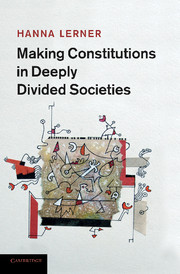Book contents
- Frontmatter
- Contents
- Acknowledgments
- Introduction
- PART I Constitutions, democracy, identity
- PART II Varieties of constitutional incrementalism
- PART III Arguments for and against constitutional incrementalism
- 6 Normative arguments for constitutional incrementalism
- 7 Potential dangers
- Conclusion
- Bibliography
- Index
6 - Normative arguments for constitutional incrementalism
Published online by Cambridge University Press: 25 October 2011
- Frontmatter
- Contents
- Acknowledgments
- Introduction
- PART I Constitutions, democracy, identity
- PART II Varieties of constitutional incrementalism
- PART III Arguments for and against constitutional incrementalism
- 6 Normative arguments for constitutional incrementalism
- 7 Potential dangers
- Conclusion
- Bibliography
- Index
Summary
Israel, India and Ireland are examples of different ways to address a common problem: how to write a democratic constitution when the society is deeply divided on what norms and goals should guide the state. The circumstances under which the Irish, Indian and Israeli constitutional arrangements were arrived at explain why they do not represent one definite model but rather a creative constitutional toolbox. They differ in their level of formality (two are written and one is not) as well as in the strategy that was chosen to address the deep societal disagreements. Israel circumvented the intense tensions between the secular and orthodox sectors of the Jewish population by avoiding drafting a constitution altogether. Instead, all Israeli governments have embraced a set of informal consociational arrangements in the religious sphere. India dealt with the major concern of enhancing unity amidst vast religious, cultural and linguistic diversity by glossing over disagreements regarding fundamental norms and values (such as in issues of personal law and national language) through the use of ambiguous legal language. The Irish Free State accommodated the conflicting pressures surrounding the drafting of the constitution by employing a strategy of ambivalence, namely by incorporating both the Irish and the British positions on the meaning of Irish sovereignty and territorial unity.
As the previous three chapters have shown, the unique social and geopolitical circumstances at the time of each of the constitutional draftings generated a different range of perceptions regarding the risks and opportunities associated with the making of the constitution, and a different range of dynamics affecting the constitutional consequences.
- Type
- Chapter
- Information
- Making Constitutions in Deeply Divided Societies , pp. 193 - 207Publisher: Cambridge University PressPrint publication year: 2011



